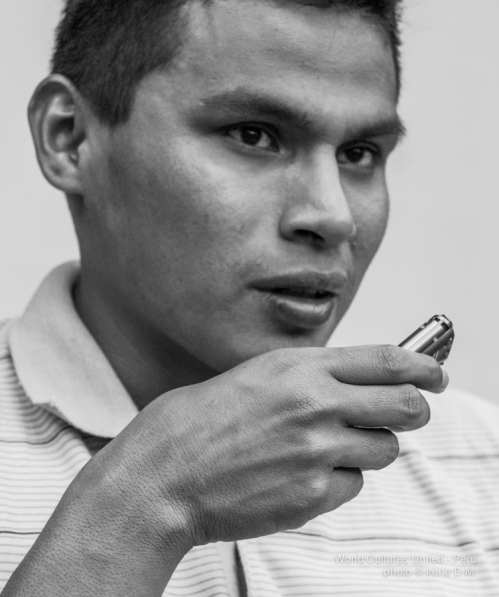Our first visit during our one-day stay in the beautiful village of Wayku-Lamas was to Roninson Sangama Tapullima.
This boy is a real inspiration for us. He became blind at the age of 4 and has taught himself to speak and use language in order to study. Now he has finished secondary school and willing to continue learning, among other things, english and how to use social media to keep connected with the World. His dream is to enter the university and study psychology. If you want to support him with donations via Western Union, these are the contact details: Full name: Roninson Sangama Tapullima – Address: Girón Lima (Girón los motilones) sin número Manzana 4, Lote 8 Wayku, Lamas – Peru – Phone number: +51 970 282 5951

He lives together with his little family og kwechua speakers and his dog.
In our interview, Roninson shared with us the story of his people, explaining to us that the actual Wayku Lamas are descendents of the warrior tribe Chankas, who fought and lost the war against the Incas, finding in this municipality a place to hide and establish themselves.
In nowadays, this small municipality is known for the production of arts and crafts, ceramics and textiles, mainly made by women.
We felt deeply touched, thankful and blessed by the purity of Roninson´s speech and, following his father´s desire of helping his son when he is not longer able to do it himself, we encourage people to help with donations. And more than donatives, we invite people interested in helping him directly, to go to this beautiful and safe village close to the Andean mountains and assist Roninson with his educational program and other needs.
We believe in his unlimited potential to continue his path for knowledge and we are truly proud of have had the great opportunity of meeting him during our journey.
“This community is characterized by people who support each other.”
“We are Quechua speakers together with the youth, which gradually has been encouraging to others, so that our identity and our customs are no further loss. We also adapt to modernize the community without losing our identity, our customs, preserving our past identity, and our identity in the future.”








